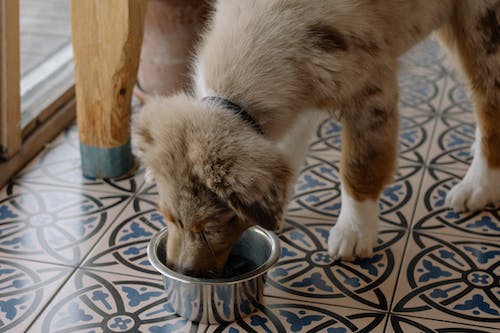Please create a free account, or login by clicking here.
Petland Hoffman Estates, IL
August 31, 2023
Just like people, pups can experience weight issues which can result in health issues. Although each dog’s weight will increase or decrease over time, every breed has an average weight. Although some medical issues can cause weight increase, one of the main culprits is more calories going into your pup than going out. Over the course of a few months this can lead to your pup being overweight. Obesity in dogs is a real issue and can be detrimental to their health and well-being.
Studies show that more than one half of dogs living in the United States are overweight. A few extra pounds on a dog are not the end of the world, but pups that are grossly overweight do have a diminished quality of life and face a wide range of health issues. Dogs that are very heavy tend to have a hard time getting around, lack energy and may end up suffering from health issues such as arthritis, hypertension, and diabetes. Helping your dog maintain a healthy weight can improve and extend your pup’s life and overall happiness.

Reduce daily calories: Begin measuring the quantity of food your dog is receiving at meal time. Instead of just pouring his food into a bowl and eyeing it out, take the time to measure it. Dogs like to eat and will normally eat whatever is in front of them.
Switch to a lower carb, higher protein diet: Shop around for higher protein dog food which will not bog your pup down. Although carbs are important, meats and other proteins are very much needed. This will help your pup look and feel his best.
Keep feeding times the same: Many dog owners provide their pup with two meals every day in twelve-hour intervals. A morning and evening feeding will help disperse the energy they need to function.
Add fiber to your dog’s diet: Fiber supplements will help your pup feel fuller quicker and are good for his overall health.
Provide plenty of fresh drinking water: Making sure that your dog is well hydrated is key in weight control and for his overall health and well-being.
Reward with fun, words, and petting, not food: When your pup does something good, he will enjoy a pet or “good boy” as much as he would enjoy a snack. Snacks are a good reward at times, but when you are trying to help your pup drop a few pounds they will only add to the struggle.
Amp up your pup’s daily exercise time: This is more than throwing a ball in the living room. Dedicate thirty minutes twice a day and take your pup outside and go for a brisk walk. Other activities such as playing outdoor fetch where your pup needs to run and retrieve a ball work well too.
Always be patient: Weight loss takes time to accomplish and being patient with your dog throughout this process is very important. Your pup can detect when you are stressed so try and be calm and relaxed. Always consult with your veterinarian: Before doing anything, give your veterinarian a call and discuss your concerns and see what he / she says.

While working with your pup in this weight loss journey, slow and steady wins the race. Set reasonable expectations and work towards the goal together. This is a day-by-day process which will take time. Over the course of this, your pup will begin to fall into this healthier routine. The key is to allow your pup to gradually accept this new routine which will eventually be second nature to him. It is more of a way of life than a diet because even after your pup reaches the desired weight, he will still need to be active and eat healthy to prevent the unwanted weight from returning.